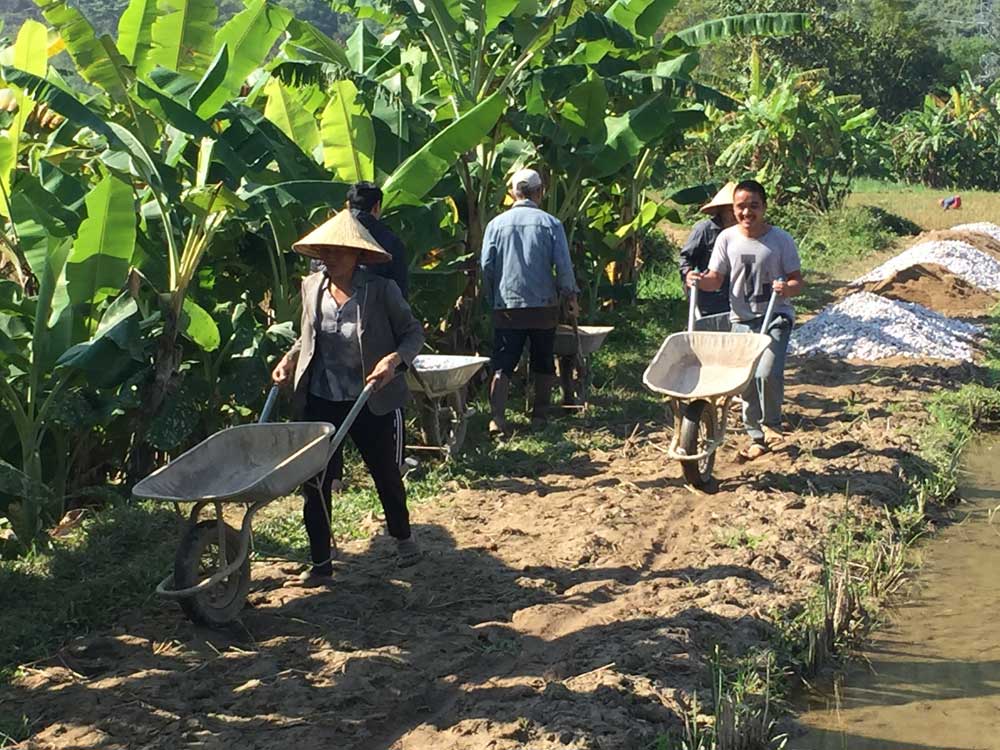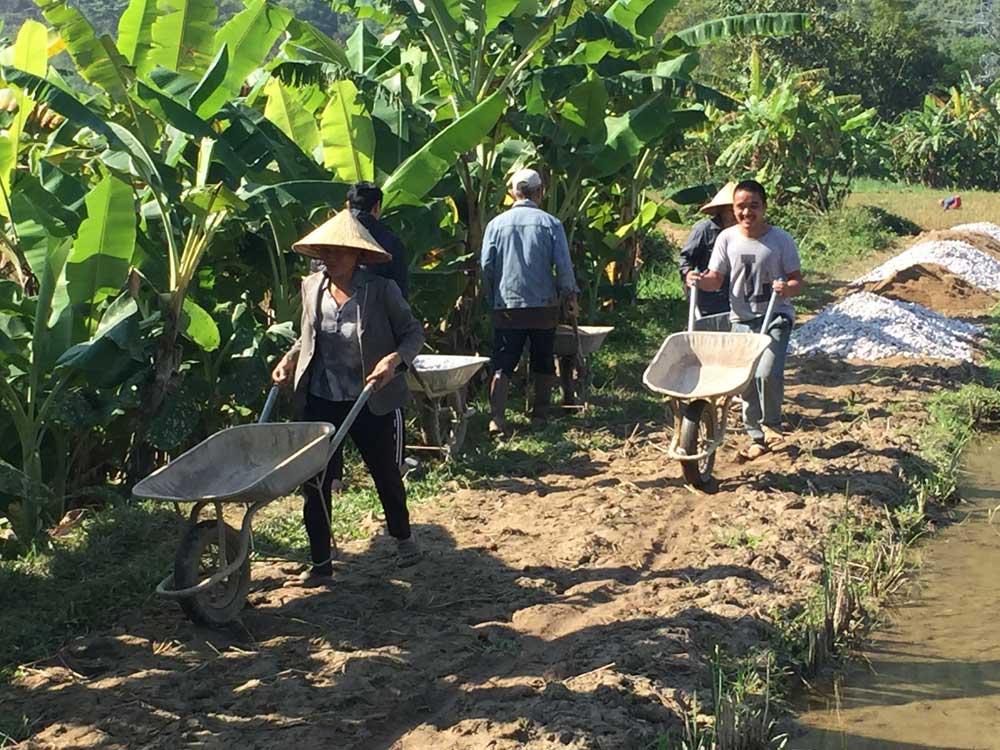
(HBO) - Over the past years, under the Party and State's guidelines on support for ethnic minority groups, Mai Chau district has effectively carried out poverty reduction policies and programmes, and socio-economic development projects, with a focus on infrastructure building and production development for communes in especially disadvantaged circumstances, thereby improving the lives of local residents.
 With the motto "The State and people
work together”, residents in Van Mai commune, Mai Chau district contribute
working days to build in-field roads convenient for agricultural production.
With the motto "The State and people
work together”, residents in Van Mai commune, Mai Chau district contribute
working days to build in-field roads convenient for agricultural production.
Xo hamlet is 15km from the centre of Na
Phon commune. Its socio-economic situation has changed a lot since ethnic
policies and programmes were launched. Inter-hamlet roads and roads to
production facilities were expanded to facilitate travel, trade and
transportation of agricultural equipment and farm produce. The Programme 135 on
poverty reduction for especially poor areas and similar project also supported
livelihood activities through introducing effective farming models such as pig
and cow farming.
Chairman of the Na Phon communal People’s
Committee Ha Van Ngan said thanks to support policies for ethnic minorities, locals’
living conditions have improved remarkably. Local infrastructure was upgraded
while residents received support in the form of seedlings, young animals and
technological transfer for farming. As a result, the lives of many poor
households improved with average income per capita reaching 14 million VND. The
rate of poor households was reduced to below 24.7 percent.
During the 2019-2020 period, the total
capital for the socio-economic development programme in especially disadvantaged
hamlets and communes reached nearly 25 billion VND. Of which, 24.145 billion
VND came from the State budget and the remainder from the public. The district
built 41 works, including classrooms, roads, irrigation works, community houses
and dykes. Other policies were also carried out in ethnic minority regions such
as support in housing, production land and water supply for daily use. Local
residents were engaged in the implementation of those policies, from choosing capable
and responsible consulting units to ensuring accuracy in technical survey,
design and project appraisal, thus ensuring the quality and efficiency of works
after construction.
Deputy head of the district ethnic affairs
office Ha Nguyen Thanh Quang said support policies for ethnic minorities have
brought about practical results. Infrastructure in ethnic minority areas have
been completed, which has basically met local people’s demand for travelling,
medical check-up and treatment, study, and facilitated trade, thus narrowing the
development gap among areas, contributing to sustainable poverty reduction.
The implementation of ethnic policies has
contributed to socio-economic development, ensuring political security, improving
material and spiritual lives of residents, and reducing poverty rate in the
district by 3 percent annually on average./.
In the spirit of "Party members go first, the people follow”, all households of Party members in the Doan Ket sub-region in Da Bac town, Da Bac district, voluntarily removed gates and fences, and donated land when the road expansion project passed through their properties. Inspired by their example, 68 households in the sub-region quickly followed suit, contributing over 1,400 sq.m of residential and perennial cropland to widen the main road through the residential area. The exemplary role of Party members in Doan Ket stands as a shining example of studying and following President Ho Chi Minh’s thought, morality, and lifestyle.
The Hoa Binh provincial People's Committee held a monthly meeting on May 29 to assess the implementation of socio-economic development tasks in the first six months of 2025, the progress of key projects, and some other important issues.
During his lifetime, President Ho Chi Minh always expressed his deep affection and special concern for children and youth. He once emphasized: "Caring for and educating children well is the responsibility of the entire Party and the entire people”; "First of all, the family (i.e. grandparents, parents, siblings) must do this job well”. "the Party Committees…, the Children’s Committee, the Youth Union, the education sector, and all related organizations must have specific plans to ensure children grow healthier and more progressive”. His teachings has been remaining valuable and serving as the guiding principles in the work of protecting, caring for, and educating children. In line with this ideology, Hoa Binh Province has continuously been prioritizing and investing resources in the well-being of children in recent years.
Mr. Nguyen Phi Long, the alternate Member of the Party Central Committee and Secretary of the Provincial Party Committee chaired the meeting of the Standing Committee of the Provincial Party Committee to provide opinions on several investment projects within the province. There was the attendance of Ms. Bui Thi Minh, the Permanent Deputy Secretary of the Provincial Party Committee and Chairwoman of the Provincial People’s Council; Mr. Bui Đuc Hinh, the Deputy Secretary of the Provincial Party Committee and Chairman of the Provincial People’s Committee and other members of the Standing Committee; the leaders from other departments, agencies, and some localities.
The Standing Board of the Vietnam Fatherland Front (VFF) Committee of Hoa Binh province held a meeting on May 28 to honour outstanding village elders, village heads, and reputable individuals from local ethnic minority and religious communities.
In mid-May, the provincial Museum organised an exhibition named "Duoi la co Dang Cong san Viet Nam quang vinh” (Under the flag of the glorious Communist Party of Vietnam). This meaningful activity took place in the joyful atmosphere to celebrate the country's major holidays and the Party congresses at all levels for the 2025-2030 term, towards the 14th National Party Congress.



 With the motto "The State and people
work together”, residents in Van Mai commune, Mai Chau district contribute
working days to build in-field roads convenient for agricultural production.
With the motto "The State and people
work together”, residents in Van Mai commune, Mai Chau district contribute
working days to build in-field roads convenient for agricultural production.